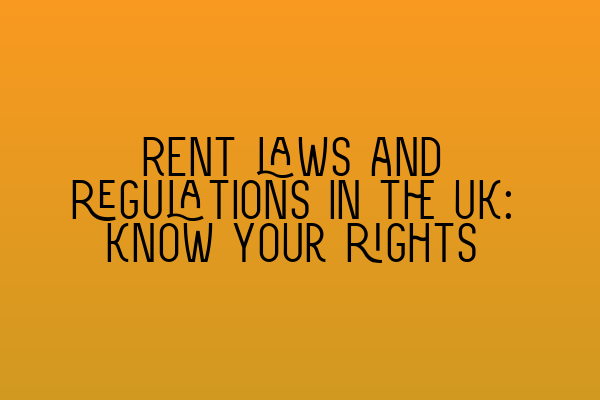### Rent Laws and Regulations in the UK: Know Your Rights
Renting a property is a common practice in the UK, with millions of people opting for this housing option. Whether you are a tenant seeking a place to rent or a landlord looking to lease out your property, it is crucial to understand the rent laws and regulations in the UK to protect your rights and ensure a fair and legal tenancy.
In this blog post, we will provide you with a comprehensive overview of the key rent laws and regulations in the UK, empowering you with the knowledge you need to navigate the rental market successfully. Keep reading to understand your rights and responsibilities as a tenant or landlord.
#### Assured Shorthold Tenancies (ASTs)
Assured Shorthold Tenancies (ASTs) are the most common type of tenancy agreement in the UK. Under an AST, tenants have the right to live in a property for a fixed term, usually six or twelve months. After this initial period, the tenancy becomes a rolling or periodic tenancy, which continues on a month-to-month basis until terminated by either party.
As a tenant, it is essential to have a written tenancy agreement that outlines the terms and conditions of your tenancy, including the rent amount, payment schedule, deposit amount and protection, and responsibilities of both the tenant and landlord. This agreement acts as a legal document and protects your rights throughout the tenancy.
#### Rent Increases and Rent Arrears
Landlords are entitled to increase the rent during an AST term, but they must follow specific procedures. The landlord must provide the tenant with proper notice, usually at least one month in advance, and the increase should be reasonable and in line with market rents.
If you are struggling to pay your rent, it is essential to communicate with your landlord as soon as possible. They may be willing to negotiate a temporary reduction or alternative payment arrangement. In case of severe financial difficulty, you may be eligible for government assistance such as Housing Benefit or Universal Credit. Seek professional advice to explore your options.
#### Tenancy Deposit Protection
When renting in the UK, landlords are required by law to protect your tenancy deposit using a government-approved tenancy deposit protection scheme. These schemes ensure that your deposit is safeguarded throughout the tenancy and handles disputes fairly if necessary.
At the start of your tenancy, your landlord should provide you with written information about where your deposit is being held and details of the tenancy deposit protection scheme. Be sure to keep this information safe, as it will be essential if any disputes arise at the end of your tenancy.
#### Repairs and Maintenance
As a tenant, you have the right to a safe and habitable living environment. Your landlord is responsible for maintaining the property and ensuring it meets certain health and safety standards. If any repairs or maintenance issues arise, it is crucial to report them to your landlord promptly.
Landlords are legally obliged to carry out necessary repairs within a reasonable timeframe. If your landlord fails to address the issues, you may have the right to take legal action or request assistance from your local authority’s housing department.
#### Ending a Tenancy
When it comes to ending a tenancy, both tenants and landlords have specific obligations to fulfill. As a tenant, you must provide your landlord with proper notice, usually one month in advance, if you wish to terminate your tenancy. Ensure you check the terms of your tenancy agreement, as there may be specific requirements for notice periods.
Landlords also have the right to end a tenancy, but they must follow the correct procedures. Depending on the circumstances, this may include giving notice, obtaining a court order, or using a Section 21 or Section 8 eviction notice. If you are a tenant facing eviction, seek legal advice immediately to understand your rights and options.
#### Seeking Legal Advice
The information provided in this blog post is a general overview of rent laws and regulations in the UK. Renting and tenancy matters can be complex, and it is always advisable to seek professional legal advice tailored to your specific situation. Solicitors at SQE Property Law & Land Law specialize in real estate matters and can provide you with expert guidance and representation.
To further prepare yourself for legal exams and deep dive into property law topics, check out our related articles:
1. [SQE 1 Practice Exam Questions](https://fqps.co.uk/sqe/sqe1-preparation/mcq-practice-quiz)
2. [SQE 1 Practice Mocks FLK1 FLK2](https://fqps.co.uk/sqe/sqe1-preparation/practice-mocks-quiz)
3. [SQE 2 Preparation Courses](https://fqps.co.uk/sqe/sqe2-preparation)
4. [SQE 1 Preparation Courses](https://fqps.co.uk/sqe/sqe1-preparation)
5. [SRA SQE Exam Dates](https://fqps.co.uk/sqe/sqe1-sqe2-exam-dates)
Remember, knowing your rights and responsibilities as a tenant or landlord is crucial for a successful and hassle-free tenancy. Stay informed, seek professional advice when needed, and empower yourself with the knowledge to protect your interests in the rental market.
